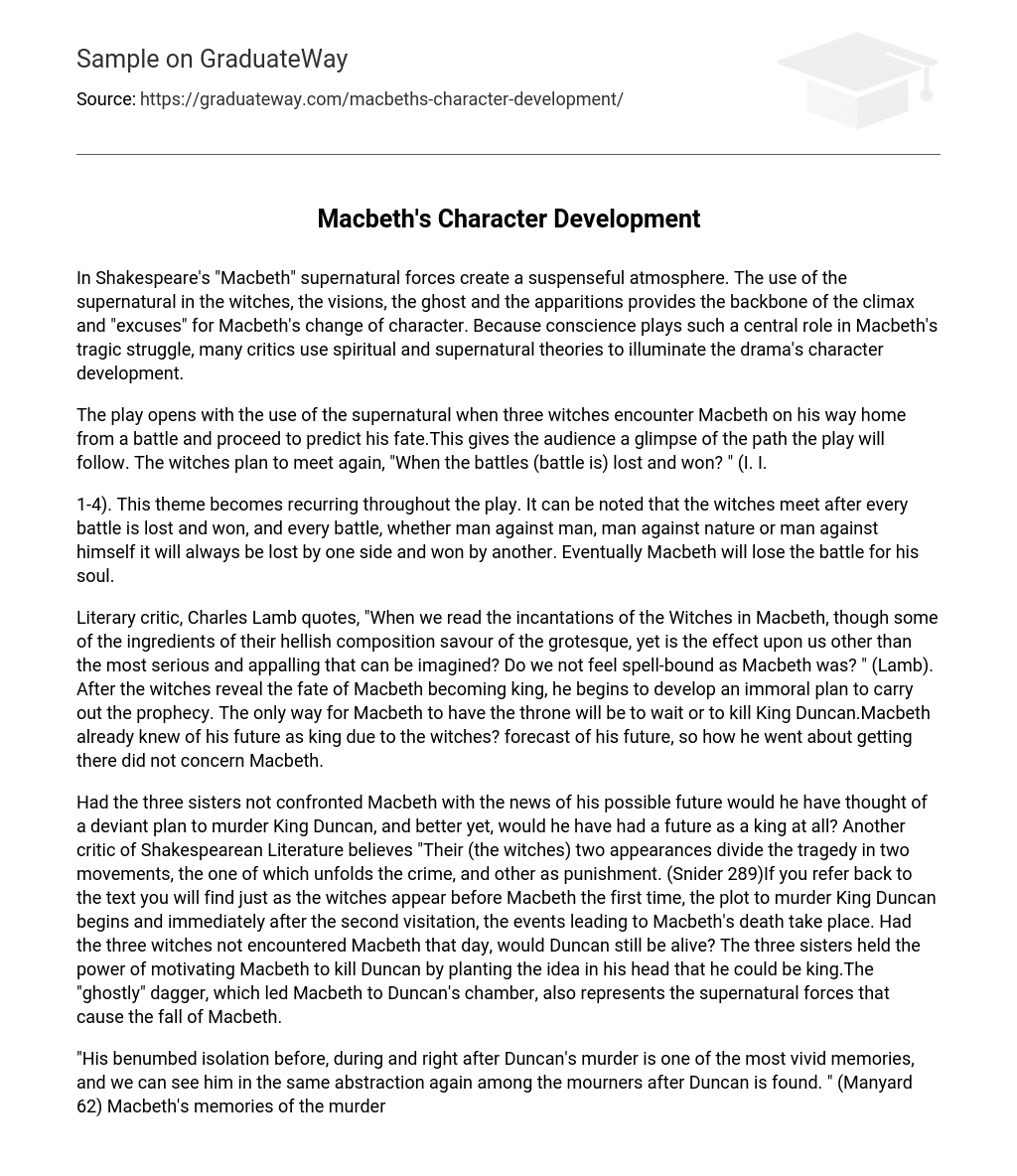Supernatural forces in Shakespeare’s “Macbeth” generate a tense atmosphere, with the witches, visions, ghost, and apparitions serving as pivotal elements in the climax. These supernatural occurrences also serve as justifications for Macbeth’s transformation. As conscience plays a crucial part in Macbeth’s tragic conflict, numerous critics employ spiritual and supernatural theories to shed light on the characters’ evolution in the play.
In the opening of the play, Macbeth is visited by three witches on his way home from a battle. These witches prophesy his future, giving the audience a glimpse of the course the play will take. The witches arrange to meet again, questioning, “When shall we three meet again, in thunder, lightning, or in rain?” (I. I.)
The play repeatedly explores the theme of losing and winning battles. It is noteworthy that the witches convene after every battle, regardless of its nature – whether it involves men, man against nature, or man against himself. In each confrontation, one side suffers defeat while the other emerges triumphant. Ultimately, Macbeth’s soul will be the battleground where he will ultimately face defeat.
Literary critic Charles Lamb suggests that the incantations of the witches in Macbeth have a profound and serious effect on the audience, leaving them spellbound just like Macbeth himself. Once the witches reveal his destiny as king, Macbeth starts to formulate an immoral plan to fulfill the prophecy. In order to claim the throne, Macbeth realizes that he must either be patient or resort to killing King Duncan. This means by which he attains the crown does not trouble Macbeth, as he is already aware of his future as king through the witches’ prophecy.
The argument has been made that if the three sisters had not informed Macbeth about his potential future, would he have devised a plan to assassinate King Duncan and become a ruler? Another critic of Shakespearean Literature contends that the witches’ presence in the play divides it into two sections: one illustrating the crime and the other presenting the punishment. Upon examining the text, we can observe that as soon as the witches manifest themselves before Macbeth for the first time, the scheme to murder King Duncan initiates, and immediately after their second appearance, events leading to Macbeth’s demise unfold. Had Macbeth not encountered the three witches on that day, would Duncan still be alive? By implanting in his mind the notion that he could ascend to kingship, these three sisters possessed the ability to motivate Macbeth into killing Duncan. The ethereal dagger that guided Macbeth towards Duncan’s room symbolizes supernatural forces ultimately responsible for Macbeth’s downfall.
In Manyard’s analysis, he highlights Macbeth’s intense feeling of isolation before, during, and immediately after Duncan’s murder. This emotional state is so vivid that even among the mourners after the discovery of Duncan’s body, Macbeth remains in a state of abstracted detachment. The memory of the murder itself is clouded for Macbeth due to the overwhelming disillusionment and distraction caused by the knife, which ultimately influenced him to carry out the killing. Macbeth follows a bloody dagger that leads him to Duncan’s room, and despite briefly reconsidering his actions, he proceeds with the regicide. Shakespeare accentuates the visibility of the dagger, possibly to symbolize its role as a recurring instrument of power that will manipulate Macbeth through blood, daggers, ghosts, and other eerie apparitions. The appearance of the dagger at this crucial moment also underscores the complex range of experiences that Macbeth, as a tragic hero, is sensitive to, albeit with characteristically ambiguous connotations.
According to Manyard (70), Macbeth demonstrates sensitivity towards things that he cannot comprehend. These peculiar events evoke uncertainty in Macbeth, leading him to confront two possible paths: one that is right and one that is wrong. The appearance of the floating dagger, along with heightened emotions and adrenaline, tempts Macbeth to commit murder. Without encountering the dagger, he would never have ascended the stairs to Duncan’s chamber.
Banquets ghost is another supernatural encounter that Macbeth faces, and it is the one that pushes him to the brink. According to author Ludwig Jekels, Macbeth portrays the fear of a son (Banquo) seeing in his own son (Macbeth) the same hostility that he once had towards his own father (Duncan), with remarkable clarity (Jekels 227). The appearance of Banquets ghost continues to torment Macbeth without end, leading him ultimately to his unintentional self-destruction.
In act 3, scene 4, lines 112-115, Macbeth expresses his astonishment to Lady Macbeth, questioning if such things can truly affect them without their amazement. He admits that she makes him feel alien to his own nature. Even with all that Macbeth has experienced so far – encountering witches and apparitions – he struggles to comprehend his affiliation with the supernatural.
This proves that Macbeth unknowingly fell under the influence of the supernatural, according to accredited author J. L. F.
Flathe asks why Macbeth is so easily led astray by the devil, while Banquo is able to resist. This highlights the power that human nature has over individuals, as people often choose the path that is most convenient for them. Macbeth’s deceitful and dishonest nature led him to follow the devil’s path, resulting in his ultimate downfall and death (Flathe 200).
Despite facing similar consequences of honesty, Banquo’s descendants ultimately gained by receiving the crown. In contrast, Macbeth’s choices were heavily influenced by supernatural encounters, resulting in his tragic and doomed fate. These otherworldly experiences and influences led Macbeth down destructive paths. If the witches, ghosts, and visions had not appeared throughout the play, what alternate actions would have steered him towards his ill-fated destiny? Without the guidance of these forces, Macbeth’s fate would have changed, rendering the plot nonexistent.





